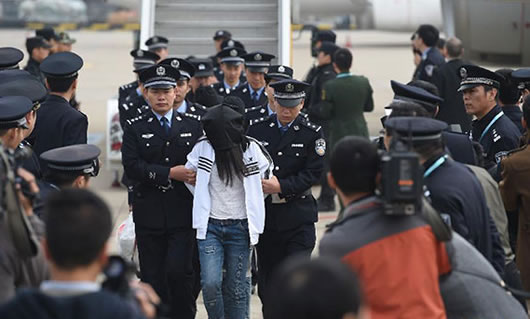Vietnam: When is an international manhunt order issued?
Manhunt is the process by which investigative agencies make decisions to locate the whereabouts of individuals who have violated criminal laws and are either on the run or their whereabouts are unknown.
In the Criminal Code, the Code of Criminal Procedure, and related documents, there are no specific terms such as "local manhunt" or "nationwide manhunt". This is because anyone, in any locality, has the right to apprehend a wanted person. Therefore, the territorial jurisdiction of a wanted order is implicitly understood to be nationwide. International wanted persons are not specifically regulated since the enforcement of Vietnamese law outside the territory is not feasible.
According to legal provisions, manhunt refers to the decision made by investigative agencies to search for and apprehend individuals who have violated criminal laws when there are signs of fleeing their place of residence or the place of execution of their sentence and relocating to another area. These individuals may employ various methods such as changing their name, appearance, or personal information, etc. to evade the law.
The investigative agency, headed by the direct supervisor of the case, has the authority to issue a manhunt order for the suspect or defendant and is responsible for coordinating with relevant authorities during the process of apprehending criminals.
For Vietnamese citizens who commit crimes within Vietnam, the manhunt typically applies nationwide. In cases where there is evidence or suspicion that the individual has fled the territory of Vietnam, the investigative agency, along with the competent authorities, collaborates with the International Criminal Police Organization (Interpol) or countries with which Vietnam has signed agreements on legal aid cooperation to arrest and extradite the offender for prosecution.
According to Article 32 of the Law on Legal Assistance 2007 of Vietnam, extradition means the hand-over by one country to another country of a person who has committed a criminal act or been criminally sentenced and is being present in its territory so that the extradition-requesting country conducts the penal liability examination or judgment enforcement against such person.
However, the steps to execute the extradition of an offender between the requesting country and the requested country are carried out in accordance with the sequence and content agreed upon in the extradition agreement, bilateral or multilateral agreements on legal aid cooperation in criminal matters, or between countries that are members of the Interpol organization. In the case of an extradited person holding the nationality of a country that has not signed a legal aid cooperation agreement, the extradition procedures shall be conducted based on respect for the laws of the country where the extradited person is residing, through diplomatic channels.

Manhunt is implemented through a manhunt order and has the following characteristics:
Grounds for issuing a manhunt order:
The competent authority can only issue a manhunt order when the following conditions are met:
- Applicable subjects: The manhunt can be applied to one of the following subjects: suspects, defendants; individuals subject to deportation; individuals serving deportation orders; individuals sentenced to imprisonment; individuals sentenced to death; individuals currently serving a prison sentence, individuals temporarily suspended from serving a prison sentence; individuals who have escaped or are of unknown whereabouts while awaiting the execution of a sentence.
- There is sufficient evidence to determine that the subject in question has fled or is of unknown whereabouts and that verification and pursuit measures have been taken but have yielded no results.
- The accurate personal background and identifying characteristics of the fugitive subject have been determined.
The competent authority to issue a manhunt order:
In all cases, only the investigative agency has the authority to issue a manhunt order. Depending on the stage of the proceedings and the specific subject of the manhunt, the competent investigative agency to issue the manhunt order is determined as follows:
- Investigation stage:
+ If in the stage of investigation an investigative agency currently settling a case detects that an accused has absconded or does not know his/her whereabouts, it shall issue a manhunt order and coordinate with the criminal pursuit police force in arresting him/her.
+ In case a person, who is in temporary custody, escapes from the custody house, the head of the custody house shall promptly report such to the head of the investigative police section of the district-level police office, where the custody house is located, aiming that the head of the investigative police section shall organize and direct the pursuit, and concurrently issue a decision to institute a criminal case against such person for the crime of escaping from the place of detention or custody prescribed in Article 311 of the Penal Code, and issue a manhunt order (in which clearly specifying other crimes for which criminal case has been instituted against such person).
+ In case a detainee escapes from the detention camp, the superintendent of the detention camp shall promptly organize a pursuing force and concurrently notify such to the investigative agency currently settling the case for the latter to issue a decision to institute a criminal case against such person for the crime of escaping from the place of detention or custody prescribed in Article 311 of the Penal Code and a manhunt order (in which clearly specifying other crimes for which the criminal case has been instituted against such person).
- Prosecution stage: If in the stage of prosecution a procuracy currently settling a case file detects that an accused has absconded, it shall request in writing the investigative agency that has accepted such criminal case to issue a manhunt order for the accused.
- Trial stage: In case the court receives the procuracy's notice of the absconding of the accused after being handled over the indictment (regardless of whether the case file has been forwarded to the court) or if the accused absconds in the stage of trial preparation, the court shall request the investigative agency to pursue the accused.
- Stage of judgment execution:
+ When a person who is out on bail is sentenced to imprisonment but absconds when a judgment execution decision is issued, the court that has issued such decision shall request in writing the criminal judgment enforcement agency of the provincial-level Police Department of the locality in which such person resides to issue a pursuit warrant.
+ When a person, whose time limit to be permitted to postpone the serving of his/her imprisonment sentence is expired, absconds after the court issues a judgment execution decision, the court shall request in writing the criminal judgment enforcement agency of the provincial-level Police Department of the locality in which such person resides to issue a pursuit warrant.
+ When a person, whose time limit to be permitted to suspend the serving of his/her imprisonment sentence is expired, absconds after the court issues a judgment execution decision, the court shall request in writing the criminal judgment enforcement agency of the provincial-level Police Department of the locality in which such person resides to issue a pursuit warrant.
+ When a person who is serving an imprisonment sentence at a prison or detention camp absconds, the superintendent of the prison or detention camp shall promptly organize a force to pursue him/her. Past 24 hours after detecting the absconding of such person, if the pursuit has no result, the superintendent of the prison or detention camp under the Ministry of Public Security, or the head of the criminal judgment enforcement agency of the provincial-level Police Department (for a person absconding from a detention camp under the provincial-level Police Department) shall issue a pursuit warrant and coordinate in the pursuit.
+ When a person sentenced to death absconds from a detention camp pending an execution decision, the superintendent of the detention camp shall promptly organize a force to pursue him/her. Past 24 hours after detecting the absconding of such person, if the pursuit has no result, the superintendent of the detention camp under the Ministry of Public Security, or the head of the criminal judgment enforcement agency of the provincial-level Police Department (for a person absconding from a detention camp under the provincial-level Police Department) shall issue a pursuit warrant and coordinate in the pursuit.
+ When a person who is serving an imprisonment sentence at a temporary custody house absconds, the criminal judgment enforcement agency of the district-level police officer shall promptly organize a force to pursue him/her. Past 24 hours after detecting the absconding of such person, if the pursuit has no result, the head of the criminal judgment enforcement agency of the district-level Police Department shall request in writing the head of the criminal judgment enforcement agency of the provincial-level Police Department to issue a pursuit warrant.
+ When a person sentenced to expulsion or serving an expulsion sentence absconds, after receiving a notice from the accommodation establishment or designated place of accommodation, the criminal judgment enforcement agency of the provincial-level Police Department shall promptly organize a pursuit. If the pursuit has no result, it shall issue a pursuit warrant within 07 days.
Sequence and procedures for manhunt:
- After determining that the conditions for a manhunt are met, the investigative agency issues a manhunt order. The manhunt order includes the following main contents:
a/ Date and place of issuance;
b/ Name of the agency, full name and position of the person issuing pursuit warrant;
c/ Full name as indicated in the birth certificate, alias (if any), date of birth, place of permanent residence registration, place of temporary residence or another place of residence (if any) of the subject who is wanted;
d/ Personal identification characteristics and enclosed photos (if any);
e/ Crime for which he or she has been accused, prosecuted or convicted, and penalty level (if any) sentenced by the court against him/her;
f/ Address and contact telephone number of the agency issuing the pursuit warrant.
- Sending and notification of pursuit warrants:
+ A pursuit warrant must be sent to:
a/ The police office of the commune, ward or district township and the police offices of the districts where the wanted person has registered his/her permanent or temporary residence and places of residence and of his/her native place;
b/ The police department of the province or centrally-affiliated city where the wanted person probably absconds, or the police departments of all provinces and centrally-affiliated cities;
c/ The Police Department for Criminal Pursuit of the Ministry of Public Security; and the Police Section for Criminal Pursuit of the provincial-level Police Department (that has issued the pursuit warrant);
d/ The professional agency in charge of case dossiers (in place which the dossiers are registered);
e/ The people's procuracy that has requested the issuance of a pursuit warrant; the people's procuracy at the same level with the investigative agency issuing the pursuit warrant; or the provincial-level people's procuracy of the locality where there are prison or detention camp and the criminal judgment enforcement agency issuing the pursuit warrant;
f/ The people's court that has requested the investigative agency for issuing a pursuit warrant.
+ Pursuit warrants must be notified on the mass media so that all agencies, organizations and individuals can know, detect and arrest subjects who are wanted.
- Issuing a decision to suspend the manhunt: When the fugitive is apprehended or surrenders, the investigative agency that issued the manhunt order will make a decision to suspend the manhunt.
Source: vietnammoi.vn
- Key word:
- Law on Legal Assistance 2007
- Number of deputy directors of departments in Vietnam in accordance with Decree 45/2025/ND-CP
- Cases ineligible for pardon in Vietnam in 2025
- Decree 50/2025 amending Decree 151/2017 on the management of public assets in Vietnam
- Circular 07/2025 amending Circular 02/2022 on the Law on Environmental Protection in Vietnam
- Adjustment to the organizational structure of the Ministry of Health of Vietnam: Certain agencies are no longer listed in the organizational structure
- Vietnam aims to welcome 22-23 million international tourists in Vietnam in 2025
-

- Vietnam: Cases of refusal of extradition to foreign ...
- 16:34, 15/01/2015
-

- Vietnam: Refusal or postponement of performance ...
- 16:29, 17/01/2014
-

- Law on Legal Assistance 2007 of Vietnam: Scope ...
- 16:20, 25/12/2012
-

- Vietnam: Summon and protection of witnesses and ...
- 16:10, 12/12/2011
-

- Fundamental contents of the Law on Legal Assistance ...
- 11:16, 18/12/2007
-

- Notable new policies of Vietnam effective as of ...
- 16:26, 11/04/2025
-
.Medium.png)
- Notable documents of Vietnam in the previous week ...
- 16:21, 11/04/2025
-
.Medium.png)
- Notable documents of Vietnam in the previous week ...
- 16:11, 02/04/2025
-
.Medium.png)
- Notable new policies of Vietnam to be effective ...
- 16:04, 02/04/2025
-
.Medium.png)
- Notable new policies of Vietnam effective from ...
- 14:51, 21/03/2025
 Article table of contents
Article table of contents
